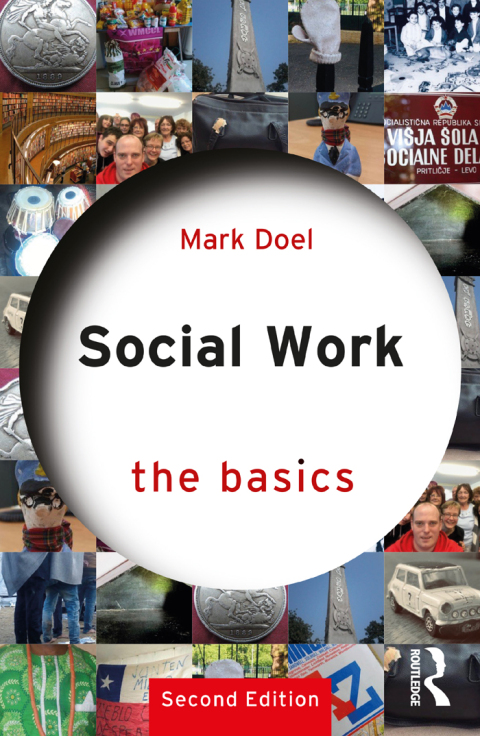Description
Efnisyfirlit
- Cover
- Endorsements
- Half Title
- Series Page
- Title Page
- Copyright Page
- Dedication
- Contents
- Lists of Figures
- Acknowledgements
- Introduction – Pioneer, Investigator, Agitator: An Introduction to the Second Edition
- 1 Reformist or Radical: Social Work’s Roots and Different Identities
- Social work in 17 objects
- Crown coin
- Food
- Martyrs’ monument
- What Is social work?
- Definitions
- Metaphors
- The social work story
- Origins of social work
- Early reformist roots
- Early radical roots
- Social work values and ethics
- Beginnings of social work knowledge
- Usable knowledge
- Service user knowledge and co-production
- Roots of models and methods
- Social and medical models
- Evolution of social work education
- Development of social work organisation
- Professional organisation
- Welfare
- Welfare state
- Welfare models
- Social work and social problems
- Social and global problems
- Social policy and wicked problems
- Social justice and social inclusion
- Care and control
- Power and oppression
- Critical social policy: the example of benefit fraud
- Unintended consequences
- Agents of the state?
- Ideology
- Religion
- Capital, labour and commodification
- Community
- Identity
- A few –isms
- Managerialism
- Reorganising services
- The Cousins
- Social pedagogy
- In conclusion
- Further reading and weblinks
- Social work in 18 people
- Note
- 2 Saint or Sinner: The Public Face of Social Work
- Social work in 17 objects
- Mitten
- Bella the dog
- Public image
- Saint and sinner
- Humour
- Blame and the public inquiry
- Public awareness
- Public service
- Public, private and other ways
- Austerity
- Media
- Press
- TV, radio, theatre and film
- Social media
- Politics
- Party politics
- Grandstanding
- Social work responses
- Who speaks for social work?
- Whistleblowing
- Themes
- Emotional involvement, stress and burnout
- Taboos
- Language
- Jargon
- Political correctness/woke
- In conclusion
- Further reading and weblinks
- Social work in 18 people
- 3 Client, Service User or Expert by Experience: How and Why People Come into Contact with Social Work
- Social work in 17 objects
- Reference library of real-life experience
- Selfie
- Neither universal nor mainstream
- Clients
- Who becomes a service user and how?
- Life course
- Looking after other people’s children
- Adoption and guardianship
- Fostering
- Children and families
- Children leaving care
- Child cruelty
- Early intervention and preventive work
- Court work and juvenile justice
- Disabilities
- Mental health
- Compulsory admission to hospital
- Drug and alcohol misuse
- Refugees, asylum seekers and travellers
- Older people
- Service users who do not want to be
- Service users providing and buying social services
- Personalisation
- Carers
- Service users as volunteers
- Home visits
- Remote working
- On a caseload
- How long do you have a social worker for?
- Eligibility, rationing and thresholds
- Case closed
- Themes
- Dilemmas in social work
- Hard to reach or seldom heard
- Race, ethnicity and diversity
- Gender
- Risk and safeguarding
- Touch
- Restraint and violence
- Sex
- In conclusion
- Further reading and weblinks
- Social work in 18 people
- 4 A Profession or a Career; A Calling or a Job: What Social Workers Do and How Social Work Is Organised
- Social work in 17 objects
- Work bag
- Postman Pat
- A profession
- What Is a profession?
- Professionalism
- Dress code
- A career or a calling
- Career structure
- Trainees, support workers and volunteers
- A job
- The workforce
- Job roles
- Recruitment and retention
- Industrial relations, unions and working conditions
- ‘Agency social work’ and locums
- Pay and pension
- Health and safety
- Themes
- Accountability
- Autonomy
- Authority
- Bureaucracy and discretion
- Teamwork
- Workload
- Social work in a pandemic
- Management and leadership
- Social work practice
- Strengths perspective
- Social work methods
- Milieu: individual, family, group, community
- Process and outcome
- Co-working
- A week in social work
- Social work and social care
- How social work services are organised
- Public sector
- Voluntary, independent and private sectors
- Other developments in social work provision
- How social work services are bought and sold
- Procuring and providing
- Outsourcing and in-housing
- Funding by results
- Registration (licensing), regulation and inspection
- Assuring the quality of social work
- Conduct and sanctions
- Relations with the neighbours
- Multi-professional work
- Health: living with a powerful neighbour
- Relations with other professions
- Integrating services
- In conclusion
- Further reading and weblinks
- Social work in 18 people
- 5 A Discipline or a Skill; An Education or a Training: How Social Workers Learn Their Practice
- Social work in 17 objects
- School of social work entrance sign
- Drum
- A discipline
- Social work research
- Doctoral social work
- Evidence-based practice and practice-based evidence
- Evaluation
- Knowledge transfer and co-production
- Theory and practice
- Social work skills
- Assertiveness
- Self-disclosure
- Recording
- New skills and technologies
- Imagination
- Reflective practice
- Competence approach
- Holistic approach
- Education and training
- Social work education
- Student social workers
- Funding
- Becoming a social worker
- The social work curriculum
- Undergraduate and postgraduate
- Decolonising the curriculum
- Routes to a qualification
- Modes of study
- Interprofessional learning
- Placements and practice learning
- Signature pedagogy – theorising from practice
- What students do and learn on placement
- How students are assessed on placements
- The organisation of social work education
- Academy and agency partnerships
- Funding
- Workforce planning
- Supervision
- Student supervision and agency supervision
- Independent supervision
- Methods of teaching student social workers
- Law and social work
- Other significant aspects of law
- Civil damages
- After qualification
- Licensing and Regulation
- Newly qualified social workers
- Continuing professional development and advanced practice
- In conclusion
- Further reading and weblinks
- Social work in 18 people
- 6 Universal or Specific: Social Work Local and Global
- Social work in 17 objects
- A–Z street finder
- Ileke ibile (traditional bead)
- Grey blanket
- Generic practice
- Generalist and specialist
- Specifics in social work
- Field
- Setting and sector
- Service user groupings
- Location
- Method
- Expertise
- Organisational form
- Country
- International social work
- Social work’s international presence
- What is international social work?
- Decolonising social work practice
- Local context
- Global context
- Global topics
- Social work, climate change and environmental justice
- Comparative practice
- Cultural competence
- Working through interpreters
- International mobility
- Cross-national activities
- Recruitment from overseas
- Working overseas
- Study exchanges
- In conclusion
- Further reading and weblinks
- Social work in 18 people
- 7 Utopia or Dystopia: ‘The Pioneers of Today Are the Prophets of Tomorrow’ (Attlee)
- Social work in 17 objects
- Crib
- Little yellow toy car
- Flag
- Challenges
- Dystopian social work
- Utopian social work
- Social work in 18 people
- Social work history in 16 questions
- Author Index
- Subjects Index






Reviews
There are no reviews yet.